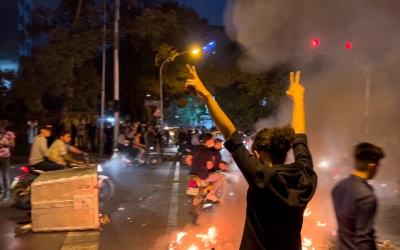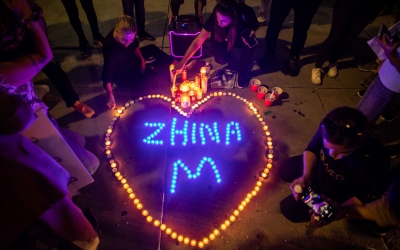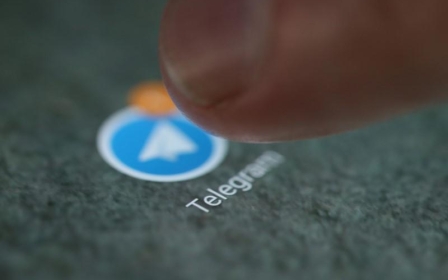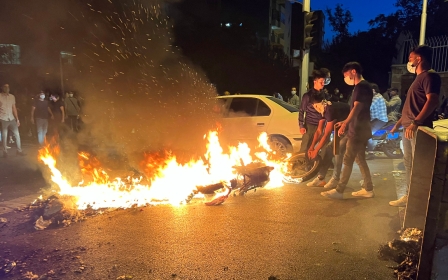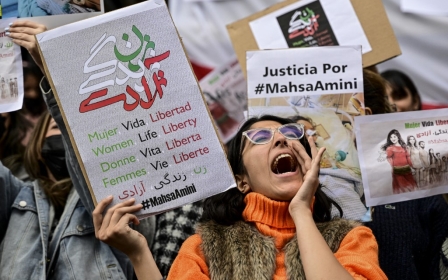'Rapid response': How Iran's tech-savvy diaspora is mobilising to support protesters
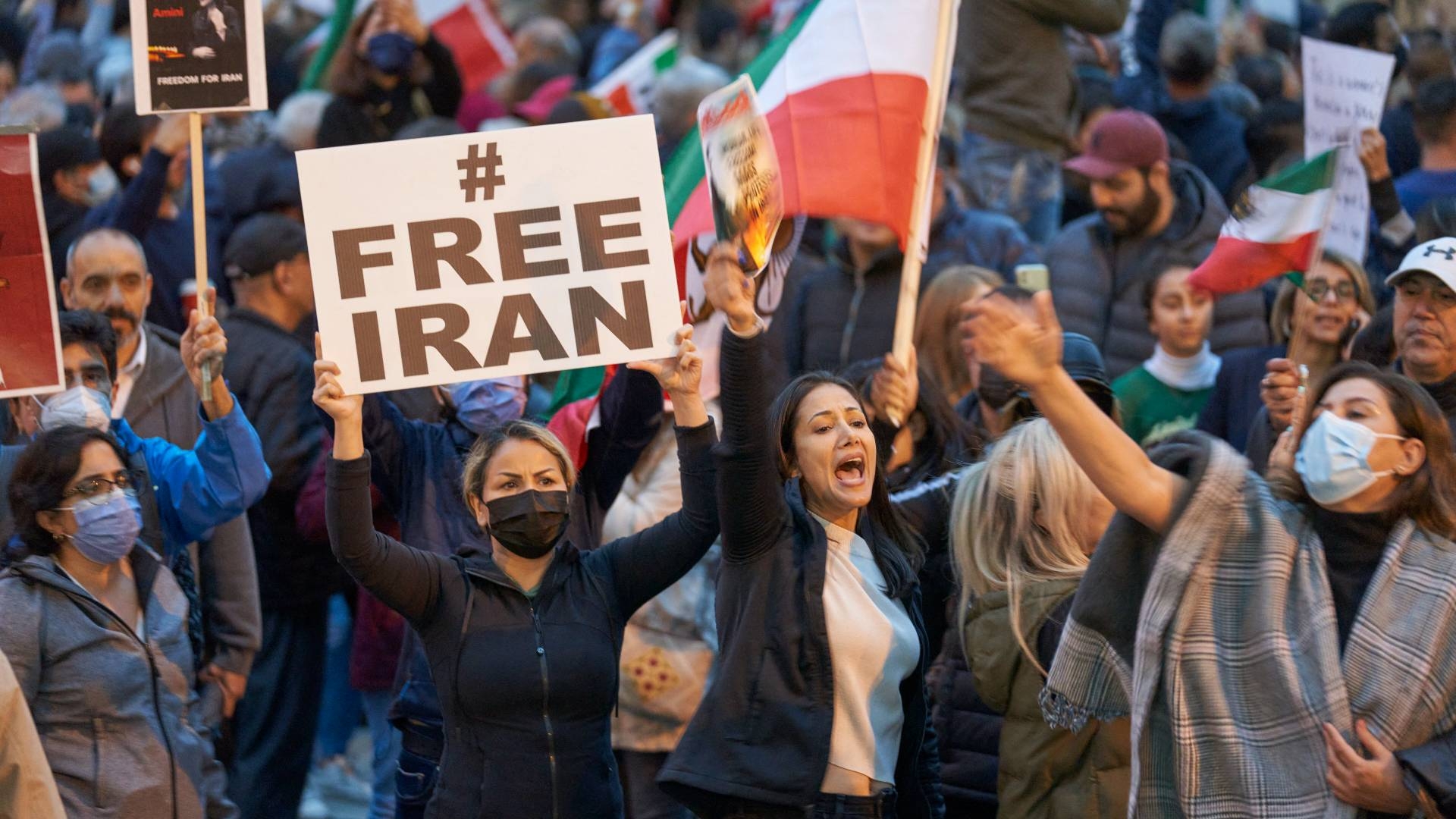
The message reached Amin Sabeti in London on Monday night - a protester had been arrested. The Islamic Republic’s security services would begin combing applications on her phone for social media posts, contacts and messages.
Sabeti went to work. He reached out to Twitter, WhatsApp and Instagram, requesting the companies shut down the activist’s accounts.
“We call the procedure rapid response,” the cyber-security expert and founder of Certfa Lab, a research group that tracks hackers linked to the Iranian government, told Middle East Eye.
“Sometimes the companies are fast and sometimes slow, but we usually get them to close the apps,” he said.
Sabeti’s description of rapid response, including dialogue with tech companies to close social media accounts (to protect their information) of those arrested in Iran, was confirmed to MEE by others engaged in what one software engineer called “damage control" operations.
New MEE newsletter: Jerusalem Dispatch
Sign up to get the latest insights and analysis on Israel-Palestine, alongside Turkey Unpacked and other MEE newsletters
A spokesperson for Meta, the parent company of WhatsApp and Instagram, didn't confirm or deny it was working with Iranian tech activists to disable the accounts of protesters arrested inside Iran. Twitter didn't respond to requests for comment by the time of publication.
Rapid response
Iran has been convulsed by unrest for nearly two weeks since the death in police custody on 16 September of 22-year-old Mahsa Amini, who was arrested by Iran’s “morality police” for allegedly violating the country’s law requiring women to cover their hair with a hijab, or headscarf.
Tech professionals, many from Iran's diaspora, have been leveraging their networks on the ground in Iran and at Big Tech companies in the West to disable the accounts of protesters and activists who have been arrested, before Iranian security officials can scour their devices.
Those efforts have been going on for years, but are now in overdrive as Tehran pursues a violent crackdown on demonstrators. In the past 11 days, protests have morphed into a general outpouring of anger across society - including religious Iranians - over government repression, excesses by security forces and general frustration at the country’s faltering economy.
At least 76 protesters have been killed by Iranian security forces during the unrest, according to Iran Human Rights (IHR), a Norway-based rights organisation.
"There is a real war and a cyberwar," Sabeti said. "Nearly every hour I get a request to secure an account of someone who has been arrested."
The move can be initiated by a call from a close friend, spouse or family member of the arrested individual. At other times, sources on the ground have informed Sabeti about the arrest of a “high-risk” individual such as a female activist or journalist.
“That person doesn’t even know we are going to do it,” he said.
Some of the sharpest minds in places like Silicon Valley have come from Iran's western diaspora. Uber CEO Dara Khosrowshahi was born in Iran and, until 2020, Iranian-American businessman Omid Kordestani was executive chairman at Twitter. Pierre Omidyar, the founder of eBay and one of the 25 richest people on earth, is an Iranian-American.
Sabeti's work is just one example of how techies are leveraging Silicon Valley clout to mobilise support for protesters in their country of origin.
The tech space has emerged as a battleground between protesters and the Iranian government. Last week, the US issued a licence allowing tech companies to provide Iranians with cyber services in an effort to circumvent Tehran's internet curbs. The licence is necessary due to the longstanding economic sanctions the US has imposed on Iran.
The move prompted Elon Musk to announce the activation of Starlink satellite services inside the country. Away from the headlines and in the shadows of cyberspace, there is also a network of software engineers and entrepreneurs from the diaspora working quietly to keep protesters plugged into the outside world and, at times, keeping them protected.
'IRGC was texting me and trying to hack me'
“Rapid Response” is just a small part of the work tech groups are doing to support protesters in the street, Amir Rashidi, director of digital rights and security at Miaan Group, told MEE.
Over the years, Miaan has provided online digital security training for activists inside Iran. The courses range in levels of sophistication from encryption to simple reminders for students to keep auto-disappear activated on their messaging apps.
“The goal is that if someone is arrested their device is as clean as possible," Rashidi said.
For people like Rashidi, the work is personal. He was an activist in Iran and was arrested following the country's 2009 elections. Eventually, Rashidi was forced to flee the country and ended up in the US.
“These protesters on the street aren’t a bunch of IDs to us. They are people that waited for me to be released from prison, and I was waiting outside for them to be released,” he said.
Over an interview on the messaging app Signal, Rashidi comes across as calm and collected. He is keen to discuss the work Miaan does studying Iran's internet laws and documenting cases of state-backed hacking. However, with protests flaring, much of his work has now shifted from capacity-building and research to security.
'Iranians are tech savvy by necessity, they know how to use proxies and get around the regime'
Firuzeh Mahmoudi, co-founder of Gershad, morality police avoidence app
Like Sabeti, he fields calls every hour for help securing protesters' accounts. "I'm online so much I feel my finger is being cut off. It's crazy," he said.
Under the circumstances, it's been important to remain alert. Rashidi recalled a phone call he had from his friend Arash*. “It was 3am and I ignored it,” he said.
Arash called two more times. On the third try, Rashidi began to suspect something was wrong with his friend and answered. “Right away they hung up.”
He texted Arash and received a request from his friend for help securing his app passwords. In one text, Arash asked Rashidi to send him a screenshot of his own passwords as a template. “It was like a bucket of cold water thrown on my head,” he said.
“I called another friend and asked where Arash was. I found out my friend had been arrested. The IRGC was texting me and trying to hack me.”
'Cat and mouse'
Iran has ramped up restrictions on the internet as part of its crackdown on the protests. It's a common approach for the government. During widespread antigovernment demonstrations in 2019, Iran cut internet access to its population of more than 80 million people.
Last week, Tehran blocked Instagram and WhatsApp, two of the last remaining active social networks in the country. Twitter, YouTube, Facebook and messaging app Signal were already blocked before the protests erupted last week.
Fereidoon Bashar is the Toronto-based executive director of ASL19, a technology and media lab born in the aftermath of Iran’s 2009 protests. ASL19 provides VPNs - virtual private networks that establish secure connections through encryption - to people inside Iran.
“When the government moves to limit internet access to the degree we are seeing, it’s a sign that they are increasing their level of suppression,” Bashar told MEE. “They don’t want the information of what they are doing to get out.”
VPNs are used to bypass those internet blockages by making it appear users are outside the country where censors operate. Like many in the Middle East, Iranians have relied on VPNs to access sites banned by their government.
'It’s a cat and mouse game and we are competing with a regime that has almost infinite resources against us'
Fereidoon Bashar, Executive Director of ASL19
ASL19’s VPN is called BeePass and is based on technology emerging from Google Jigsaw. Sabeti, from Certfa lab, is also providing a VPN for Iranians which currently boasts about three million users.
Bashar says demand for VPNs has surged. In the past week, ASL19’s user support system has received over 3,000 help tickets per day.
VPNs have to be constantly reconfigured to evade Iran’s security services.
“It’s a cat and mouse game and we are competing with a regime that has almost infinite resources against us,” Bashar said.
One of the challenges ASL19 faces is getting VPNs into the hands of Iranians. Those who still have access to Telegram or Twitter can find links online. Satellite TV penetration in Iran is also high and is used to skirt internet outages.
BBC Persian and diaspora news channels have continued to broadcast throughout the country during the protests.
“They interview us and other organisations,” Bashar said.
ASL19 shares an email address manned by a bot that replies to messages with links to ASL19’s VPN and others like Tor or Psiphon that Iranians can download.
“Email tends to be one of the last frontiers that the government blocks. So it’s more resilient,” Bashar added. “And, of course, we still rely on word of mouth.”
'Savvy by necessity'
In keeping with a movement in which women have taken centre stage, a popular application has been Gershad.
Gershad was introduced in 2016 to help Iranian women avoid the country’s morality police by crowdsourcing their locations and displaying them on a Google map. Users can report locations up to 500 metres away with a "bearded man" icon.
The app has been downloaded 84,397 times since its introduction, according to information shared with MEE by Gershad’s team. Its online presence has skyrocketed since the protests began. Between 7-14 September, Gershad had 191k impressions on Twitter. Those numbers jumped to 1.4m between 15-22 September.
“Users are organically repurposing the app to share the location of riot police and where protests are taking place,” Firuzeh Mahmoudi, California-based co-founder of Gershad and executive director of United for Iran, an NGO working to improve civil liberties in Iran, told MEE.
'Nearly every hour I get a request to secure an account of someone who has been arrested'
Amin Sabeti, founder of Certfa Lab
Mahmoudi said the Gershad team had been reluctant to redesign the app specifically as a protest tool over concerns that it might endanger some users who have not joined the demonstrations, but added: “People are now using the buttons in ways they are not designed for.
“Iranians are tech savvy by necessity; they know how to use proxies and get around the regime.”
The tech professionals who spoke with MEE for this article come from across the political spectrum. On issues such as the US’s return to the Iranian nuclear deal and sanctions, the diaspora has often been divided.
“The diaspora encompasses a broad swath of political opinions and orientations,” said Behnam Ben Taleblu, senior researcher at the Foundation for Defense of Democracies, a Washington DC-based think-tank that opposed the 2015 nuclear deal.
“[However] what has been fascinating to watch is their near-unity of purpose to help those in Iran gain internet access and concurrently amplify abroad the stories, voices and concerns of their compatriots facing violent repression in Iran,” he added.
Tech support
But the tech space has still been a source of some division. While some activists say that western tech companies are cooperating to protect protesters, others are frustrated because they believe those companies are also curbing their voices.
Activists have warned that the Iranian government is using the popular messaging app Telegram to identify protesters. Photographs of protesters have been posted on a Telegram channel called Setade114, which boasts about 20,000 subscribers, in what activists have called a "snitch line".
Meanwhile, some have accused Meta-owned WhatsApp of coordinating with the Iranian government to curtail communication outside the country. Instagram has also been accused of removing videos of protesters in Iran. MEE viewed screenshots of Instagram posts with a popular protest chant “death to the dictator” taken down for violating the platform’s community guidelines.
Sabeti, who has engaged with Big Tech on rapid response operations, qualifies the level of support Iranian activists are receiving, citing the Instagram accounts that have been blocked: “I would say the negative impact is higher than the positive impact.”
MEE reached out to Meta for comment on the accusations that it has been silencing protesters on its platforms.
In a written response, a spokesperson said: “We’re not limiting access to our apps in Iran nor are we censoring anyone’s voices at the behest of the Iranian government. We remain focused on making sure as many people as possible can use our services to share what matters to them, while only removing content that breaks our rules.”
Mahmoudi from Gershad believes Big Tech has been more responsive to activists this time, in part due to the work of members of the diaspora within the industry. "Things are being advocated for more thoughtfully," she said.
“Tech companies are behemoths that do their own thing. Any decision needs someone to advocate for it, especially if there is no direct benefit for the company.”
One strand that appears to unite members of Iran's diaspora in the tech space who spoke with MEE is a belief that they are merely serving as back-end support for a movement on the ground that is the real driver of change.
“They [protesters] are the ones leading this inside the country. The young people who are putting their lives on the line, taking their hijab off and walking up to these old men, saying ‘bring it on’,” Mahmoudi said.
Sabeti added: “At the end of the day, the regime isn’t going to collapse because of what we do in the sky, but what happens on the street."
* Name has been changed to protect his identity
Middle East Eye delivers independent and unrivalled coverage and analysis of the Middle East, North Africa and beyond. To learn more about republishing this content and the associated fees, please fill out this form. More about MEE can be found here.


